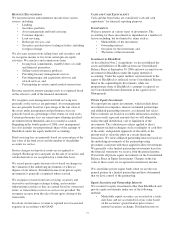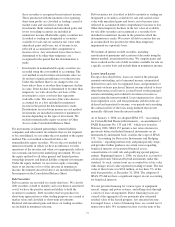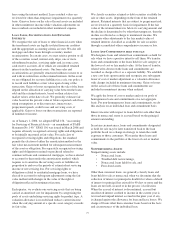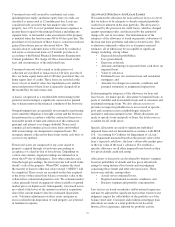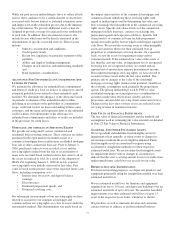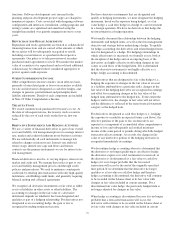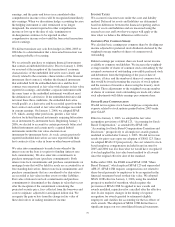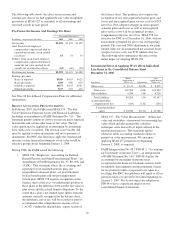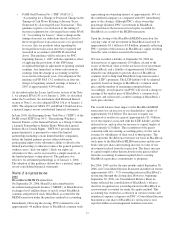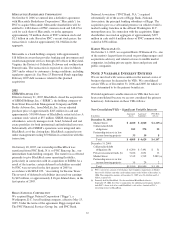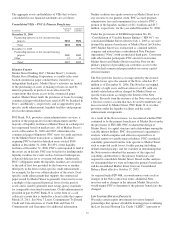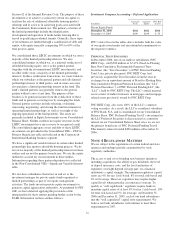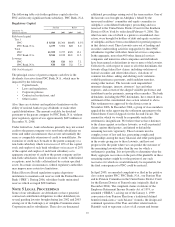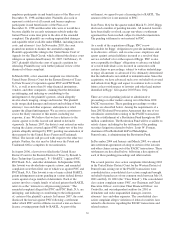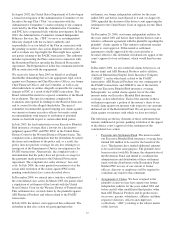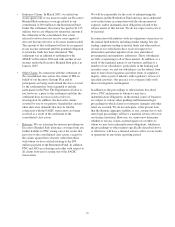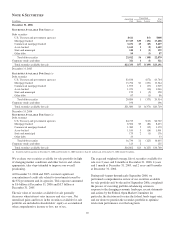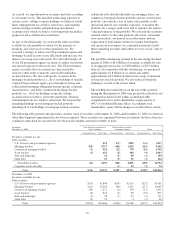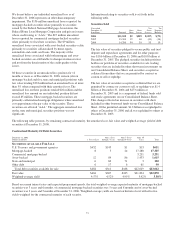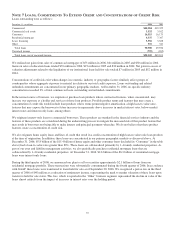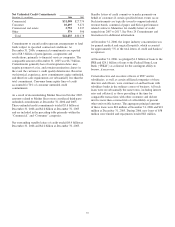PNC Bank 2006 Annual Report Download - page 93
Download and view the complete annual report
Please find page 93 of the 2006 PNC Bank annual report below. You can navigate through the pages in the report by either clicking on the pages listed below, or by using the keyword search tool below to find specific information within the annual report.
The aggregate assets and liabilities of VIEs that we have
consolidated in our financial statements are as follows:
Consolidated VIEs – PNC Is Primary Beneficiary
In millions
Aggregate
Assets
Aggregate
Liabilities
December 31, 2006
Partnership interests in low income housing
projects $834 $834
Total $834 $834
December 31, 2005
Partnership interests in low income housing
projects $680 $680
Other 12 10
Total $692 $690
M
ARKET
S
TREET
Market Street Funding LLC (“Market Street”), formerly
Market Street Funding Corporation, is a multi-seller asset-
backed commercial paper conduit that is owned by an
independent third party. Market Street’s activities are limited
to the purchasing of assets or making of loans secured by
interests primarily in pools of receivables from US
corporations that desire access to the commercial paper
market. Market Street funds the purchases or loans by issuing
commercial paper which has been rated A1/P1 by Standard &
Poor’s and Moody’s, respectively, and is supported by pool-
specific credit enhancement, liquidity facilities and program-
level credit enhancement.
PNC Bank, N.A. provides certain administrative services, a
portion of the program-level credit enhancement and the
majority of liquidity facilities to Market Street in exchange for
fees negotiated based on market rates. All of Market Street’s
assets at December 31, 2006 and 2005 collateralize the
commercial paper obligations. PNC views its credit exposure
for the Market Street transactions as limited. Facilities
requiring PNC to fund for defaulted assets totaled $850
million at December 31, 2006. For 85% of the liquidity
facilities at December 31, 2006, PNC is not required to fund if
the assets are in default. PNC may be liable for funding under
liquidity facilities for events such as borrower bankruptcies,
collateral deficiencies or covenant violations. Additionally,
PNC’s obligations under the liquidity facilities are secondary
to the risk of first loss provided by the borrower or another
third party in the form of deal-specific credit enhancement –
for example, by the over collateralization of the assets. Deal-
specific credit enhancement that supports the commercial
paper issued by Market Street is generally structured to cover
a multiple of the expected historical losses for the pool of
assets and is sized to generally meet rating agency standards
for comparably structured transactions. Credit enhancement is
provided in part by PNC Bank, N.A. in the form of a cash
collateral account that is funded by a loan facility that expires
March 25, 2011. See Note 7 Loans, Commitments To Extend
Credit and Concentrations of Credit Risk and Note 24
Commitments and Guarantees for additional information.
Neither creditors nor equity investors in Market Street have
any recourse to our general credit. PNC accrued program
administrator fees and commitment fees related to PNC’s
portion of the liquidity facilities of $11.3 million and $3.7
million, respectively, for the year ended December 31, 2006.
Under the provisions of FASB Interpretation No. 46,
“Consolidation of Variable Interest Entities (“FIN 46”), we
consolidated Market Street effective July 1, 2003 as we were
deemed the primary beneficiary of Market Street. In October
2005, Market Street was restructured as a limited liability
company and entered into a subordinated Note Purchase
Agreement (“Note”) with an unrelated third party. Consistent
with other market participants PNC elected to restructure
Market Street and Market Street issued the Note for the
primary purpose of providing our customers access to the
asset-backed commercial paper markets in a more capital-
efficient manner.
The Note provides first loss coverage whereby the investor
absorbs losses up to the amount of the Note, which is $5.7
million as of December 31, 2006. The Note has an original
maturity of eight years and bears interest at 18% with any
default-related interest/fees charged by Market Street on
specific transactions accruing to the benefit of the Note
holder. Proceeds from the issuance of the Note were placed in
a first loss reserve account that may be used to reimburse any
losses incurred by Market Street, PNC Bank, N.A. or other
providers under the liquidity facilities and the credit
enhancement arrangements.
As a result of the Note issuance, we reevaluated whether PNC
continued to be the primary beneficiary of Market Street under
the provisions of FIN 46R. PNC evaluated the design of
Market Street, its capital structure and relationships among the
variable interest holders. PNC also performed a quantitative
analysis, which computes and allocates expected loss or
residual returns to variable interest holders. PNC considered
variability generated from the risks specific to Market Street
such as expected credit losses, facility pricing (including
default-related pricing), and fee volatility in determining that
the Note investor absorbed the majority of the expected
variability and therefore is the primary beneficiary and
required to consolidate Market Street. Based on this analysis,
we determined that we were no longer the primary beneficiary
and deconsolidated Market Street from our Consolidated
Balance Sheet effective October 17, 2005.
As required under FIN 46R, reconsideration events such as
changes in the Note contractual terms, additional Note
investors and or changes in the inherent Market Street risks
would trigger PNC to determine if the primary beneficiary has
changed.
L
OW
I
NCOME
H
OUSING
P
ROJECTS
We make certain equity investments in various limited
partnerships that sponsor affordable housing projects utilizing
the Low Income Housing Tax Credit (“LIHTC”) pursuant to
83


